新概念二册_第一课讲解A_private_conversation
新概念英语第二册第1课Aprivateconversation

新概念英语第二册第1课Aprivateconversation主语一般为名词、代词或名词短语,通常位于动词之前。
动词必须与主语“一致”,所以主语决定动词的单复数形式(如Iam,youare,heha)。
宾语一般为名词、代词或名词短语。
在主动句中,宾语一般位于动词之后。
一个句子不总需要有宾语。
状语的位置比较灵活。
当一个句子里有一种以上的副词时,地点副词的一般位置是在方式副词之后、时间副词之前,如上面的最后一个例句。
时间状语可以在句尾,也可以在句首:LatnightLucywenttothetheatre. 昨晚露西去剧院看戏了。
Iheardavoiceatthedoorjutnow. 我刚才听到门口有声音。
Samlitenedtothetoryquietly. 萨姆静静地听着故事。
Themanranawayquickly. 那人很快跑掉了。
(无宾语)词汇学习Wordtudy 1.enjoyvt. 基本意义为“欣赏”、“享受”、“喜爱”,后面一般跟名词、代词(包括反身代词)或动名词形式。
(1)Didyouenjoythemovielatnight你喜欢昨晚的电影吗Ienjoyeditverymuch.我很喜欢。
(2)Janedoen'tenjoywimming.Sheenjoygoingtothetheatre. 简不喜欢游泳。
她喜欢去剧院看戏。
(3)Enjoyyourelf! 好好玩吧!Wealwayenjoyourelve. 我们总是玩得很开心。
2.pay (1)vt.,vi.支付(价款等):Haveyoupaidtheta某i-driver 你给出租车司机钱了吗?Youcanpayadepoitofthirtypound…您可以先付30英镑的定金……Ipaid50dollarforthikirt. 我花50美元买了这条裙子。
I'llpaybyintalment. 我将分期付款。
新概念第二册Lesson1 A private conversation详解

Lesson1 A private conversationprivate adj. 私人的conversation n. 谈话theatre n. 剧场,戏院seat n. 座位play n. 戏loudly adv. 大声地angry adj. 生气的angrily adv. 生气地attention n. 注意bear v. 容忍business n. 事rudely adv. 无礼地,粗鲁地Last week I went to the theatre. I had a very good seat. The play was very interesting. I did not enjoy it. A young man and a young woman were sitting behind me. They were talking loudly. I got very angry. I could not hear the actors. I turned round.I looked at the man and the woman angrily. They did not pay any attention. In the end, I could not bear it. I turned round again. "I can't hear a word!" I said angrily."It's none of your business," the young man said rudely. "This is a private conversation!"参考译文:上星期我去看戏. 我的座位很好, 戏很有意思, 但我却无法欣赏. 一青年男子与一青年女子坐在我的身后, 大声地说着话. 我非常生气, 因为我听不见演员在说什么. 我回过头去怒视着那一男一女, 他们却毫不理会. 最后, 我忍不住了, 又一次回过头去, 生气地说 : “我一个字也听不见了!”“不关你的事, “那男的毫不客气地说, “这是私人间的谈话!”美音:肯定I can否定I can't,它的/t/是吞进去的, 在读音上很难区别, 只能根据上下文来定The writer could not bear it. He could not ______ it.a. carryb. sufferc. standd. liftbear 忍受=standsuffer 遭受,忍受 (精神或肉体上)痛苦,suffer后面必须加一种痛苦I suffer the headache.(肉体上的痛苦)He often suffers defeat.(精神上的痛苦)(defeat n. 失败)单词:1 a.私人的:______________2 n.谈话:______________3 n.剧场,戏院:______________4 n.座位:______________5 n.戏:______________6ad.大声地:______________7a.生气的:______________8ad.生气地:______________9n.注意:______________10v.容忍:______________11n.事:______________12 ad.无礼地,粗鲁地:______________ 词组:默写课文:。
新概念第二册第一课讲解

lesson1---- A private conversation课文内容:Last week I went to the theatre(see a film,go to the cinema).I had a very good seat. The play was very interesting.I did not enjoy it.A young man and a young woman were sitting behind me.They were talking loudly.I got very angry. I could not hear the actors.I turned round. I looked at the man and the woman angrily.They did not pay any attention.In the end, I could not bear it.I turned round again. ‘I can't hear a word!’I said angrily.‘It's none of your business,’the young man said rudely.‘This is a private conversation!’NEW WORDS AND EXPRESSIONS生词和短语★private adj。
私人的 n。
士兵,列兵(individual, personal)in private 秘密地:非公开地;秘密地或在私下地privacy:隐私 it's a privacy. adj。
privateer (战时特准攻击敌方商船的)武装民船,私掠船拯救大兵瑞恩,private soldier:大兵private citizen普通公民 , private life:私生活it's my private letter/house;private school(私立学校)public:公众的,公开的public school公立学校;public letter公开信;public place公共场所★conversation n。
新概念2lesson1A-Private-Conversation私人谈话(共28张PPT)

4. A young man and a young woman were sitting behind me. 一青年男子与一青年女子坐在我的身后。 语言 点:本句时态:were sitting为过去进行时
behind反义词:in front of。 I was sitting in front of them.
1)enjoy sth 享受,喜欢,欣赏 enjoy music享受音乐; enjoy dinner享受宴会; enjoy life享受生活。
2)enjoy doing sth.喜欢做某事。 enjoy swimming喜欢游泳; enjoy fishing喜爱钓鱼。
3)enjoy oneself(反身代词) 在请客人吃菜时可说Enjoy yourself!
6. I got very angry. 我很生气。
语言点: I was very angry.我很生气。
I got very angry.我变得很生气。
get表示“变得”,强调变化的过程,后接形容词。
e.g.
get old变老;
get hot变热;
get hungry感到饥饿
7.I could not hear the actors.我听不到演员们在 说什么。
9.They did not pay any attention(to me). 他们却毫 不理会。
语言点: They paid no attention(to sb/sth). not...any...=no
Lesson 1 A Private Conversation
• 我们上次去看电影是什么时候? • We ... to the movies ...
Listening Exercises
Dudu新概念英语二册第一课讲解文本Lesson 1 Aprivate conversation
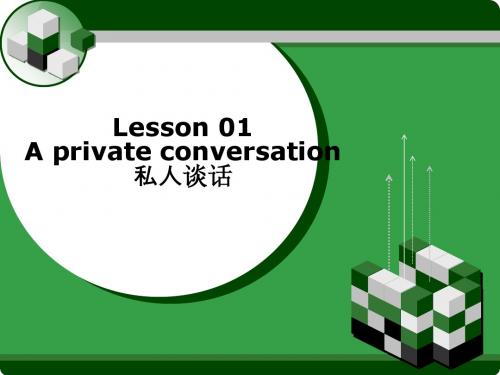
New words and expressions 生词和短语
★private adj.私人的 ① adj. 私人的 private life 私生活 private school 私立学校 private car 私家车 private teacher 私人教师 private company 私人公司 private property 私有财产 It's my private letter/house. 这是我的私人信件/房子。 ② adj. 普通的 private citizen 普通公民 I’m a private citizen. (citizen n. 公民) private soldier 大兵 参考电影:《Private Ryan》(《拯救大兵瑞恩》)
YOUR SITE HERE
Key structure 关键句型
8、I could not hear the actors. hear 听到 Can you hear the me ? Listen to 听 Don't listen to him
9、 I turned round. turn round (英式)= turn around (美式)转身,回头 turn left 向左转 turn right 向右转 turn over 翻身
YOUR SITE HERE
New words and expressions 生词和短语
★play n.戏
player 运动员,比赛者 playground 操场 playboy 花花公子 playfellow游戏伙伴 play football/play basketball/play chess 玩国际象棋 play the piano/ play the violin /play the fife 吹笛子
(最新版)新概念第二册Lesson-1--A-private-conversation

business rudely attention
bear
Grammar
英语中共有三种句子结构:简单句、并列句和复合句。
英语中,只含有一个主谓结构并且句子各成分都只由单词 或短语构成的独立句子叫做简单句。 简单陈述句:叙述一件事情。 例如:I am a teacher. You are student. I go to school by bus in the morning.
熊
.
give sb. a bear hug
loud
adj.大声的
----
loudly
angrily rudely
adv.大声地
adv.生气地 adv.无礼地,粗鲁地
angry adj. 生气的 rude adj.粗鲁的
形容词变副词的规则: 1.一般情况下直接加“ly”,如quick---quickly, loud--loudly, glad—gladly, real-really, slow-slowly, careful-carefully 等。 2.以辅音字母加y结尾的变y为i,然后再加-ly,如happy---happily, easy-easily, busy-busily 3. 少数以 e 结尾的形容词,要去掉 e 再加 -ly 。例如: true-truly, terribleterribly,possible-possibly等。 但绝大多数以e结尾的形容词仍然直接 加-ly。例如:rude-rudely, polite-politely, wide-widely等。
She studies in a private school
Let's discuss this later in private
新概念英语2Lesson1知识点讲解
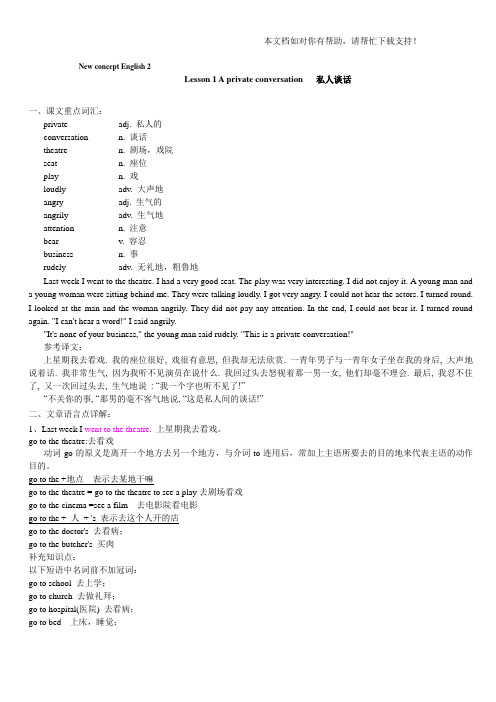
参考译文:
上星期我去看戏.我的座位很好,戏很有意思,但我却无法欣赏.一青年男子与一青年女子坐在我的身后,大声地说着话.我非常生气,因为我听不见演员在说什么.我回过头去怒视着那一男一女,他们却毫不理会.最后,我忍不住了,又一次回过头去,生气地说: “我一个字也听不见了!”
“不关你的事, “那男的毫不客气地说, “这是私人间的谈话!”
二、文章语言点详解:
1、Last week Iwent to the theatre.上星go的原义是离开一个地方去另一个地方,与介词to连用后,常加上主语所要去的目的地来代表主语的动作目的。
attentionn.注意
bearv.容忍
businessn.事
rudelyadv.无礼地,粗鲁地
Last week I went to the theatre. I had a very good seat. The play was very interesting. I did not enjoy it. A young man and a young woman were sitting behind me. They were talking loudly. I got very angry. I could not hear the actors. I turned round. I looked at the man and the woman angrily. They did not pay any attention. In the end, I could not bear it. I turned round again. "I can't hear a word!" I said angrily.
新概念英语(第二册第1课讲解)
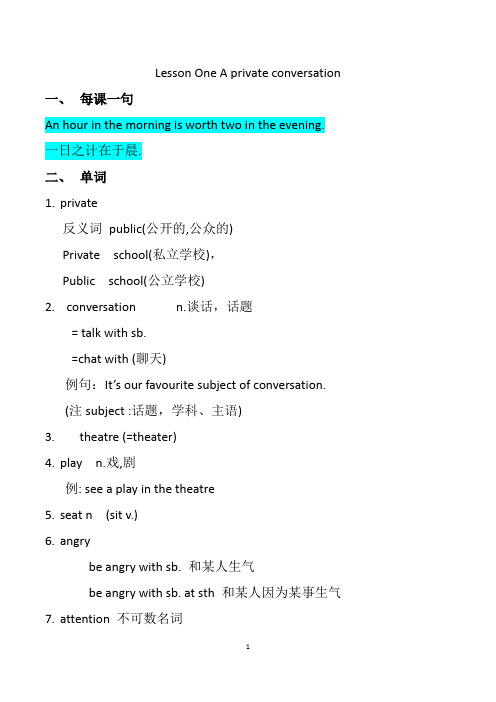
Lesson One A private conversation 一、每课一句An hour in the morning is worth two in the evening.一日之计在于晨.二、单词1.private反义词public(公开的,公众的)Private school(私立学校),Public school(公立学校)2.conversation n.谈话,话题= talk with sb.=chat with (聊天)例句:It’s our favourite subject of conversation.(注subject :话题,学科、主语)3.theatre (=theater)4.play n.戏,剧例: see a play in the theatre5.seat n (sit v.)6.angrybe angry with sb. 和某人生气be angry with sb. at sth 和某人因为某事生气7.attention 不可数名词pay attention to n./doing 注意做某事pay no attention to n./doing 一点都没注意pay much attention to n./doing 多加留心,多注意8.bear n.熊v.容忍(bore ,borne)类似单词:beer(啤酒),dear(亲爱的)同义词:stand(容忍),(stood,stood)stand doing sth 容忍做某事例句: I can’t stand it. 我一点不喜欢.9.business(ness名词后缀) 事;商业;生意business man商人; business woman 女商人10.k ey n.钥匙the key to the door键盘keyboard答案the key to the question = the answer to the question 关键的,重点的key school 重点学校11.r ude adj.无礼的反义词:polite; 近义词: impolite(p 开头的词,否定前缀im) Be rude to sb. 对…无礼Be friendly to sb. 对…友好Be polite to sb. 对…有礼貌注:否定前缀就当没看见,含有否定前缀的不是否定词。
新概念英语第二册-unit1-A-private-conversationPPT课件

-
6
生词讲解
loudly ['laʊdlɪ] adv.大声地 loud adj. speak loudly/speak in the loud voice angry adj.生气的 angrily adv.生气地 be angry with sb.对谁生气 美式:mad
-
7
生词讲解
4
生词讲解
private['praɪvət] adj.私人的
private school私立学校 private car 私家车 private house私人住宅
privacy n.隐私 invade one's privacy
private property(财产)
反义词
public ['pʌblɪk] adj.公共的
-
13
课文讲解
I got very angry.
原型:get——变得
I was angry. 强调状态
I got angry. 例句: warmer and warmer.
It's getting late.
-
14
课文讲解
I turned round.I looked at the man and the woman angrily. turn round=turn around(美式) In the end,I could not bear it. in the end=at last It's none of your business none 代词,没有人 not one mind your own business
-
12
课文讲解
A young man and a young woman were sitting behand me. 过去进行时 例句: What are you doing ? What were you doing last night? I was studying for my test last night.
新概念二Lesson 1 A Private Conversation最全知识点总结
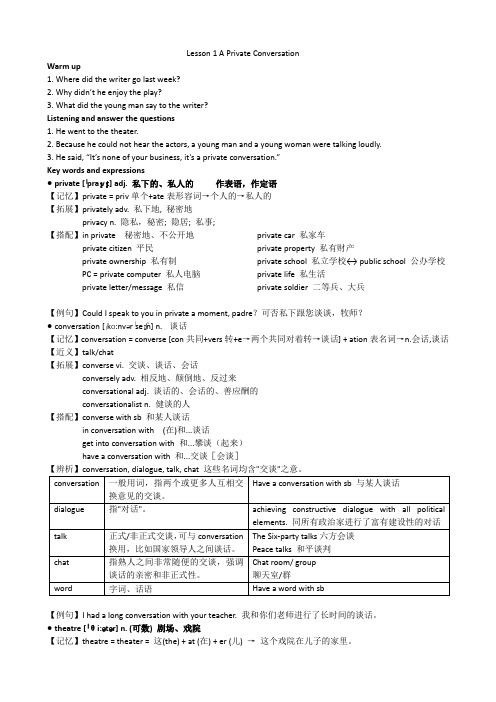
Lesson 1 A Private ConversationWarm up1. Where did the writer go last week?2. Why didn’t he enjoy the play?3. What did the young man say to the writer?Listening and answer the questions1. He went to the theater.2. Because he could not hear the actors, a young man and a young woman were talking loudly.3. He said, “It’s none of your business, it’s a private conversation.”Key words and expressions● private [ˈpraɪvɪt] adj. 私下的、私人的作表语,作定语【记忆】private = priv单个+ate表形容词→个人的→私人的【拓展】privately adv. 私下地, 秘密地privacy n. 隐私,秘密; 隐居; 私事;【搭配】in private 秘密地、不公开地private car 私家车private citizen 平民private property 私有财产private ownership 私有制private school 私立学校↔ public school 公办学校PC = private computer 私人电脑private life 私生活private letter/message 私信private soldier 二等兵、大兵【例句】Could I speak to you in private a moment, padre?可否私下跟您谈谈,牧师?● conversation [ˌkɑ:nvərˈseɪʃn] n.谈话【记忆】conversation = converse [con共同+vers转+e→两个共同对着转→谈话] + ation表名词→n.会话,谈话【近义】talk/chat【拓展】converse vi. 交谈、谈话、会话conversely adv. 相反地、颠倒地、反过来conversational adj. 谈话的、会话的、善应酬的conversationalist n. 健谈的人【搭配】converse with sb 和某人谈话in conversation with (在)和...谈话get into conversation with 和...攀谈(起来)have a conversation with 和...交谈[会谈]【例句】I had a long conversation with your teacher. 我和你们老师进行了长时间的谈话。
新概念第二册Lesson1 A private conversation课文详解
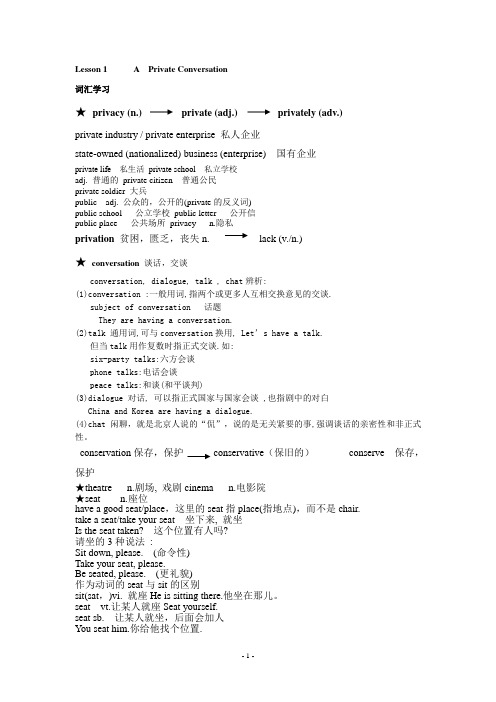
Lesson 1 A Private Conversation词汇学习★privacy (n.)private (adj.) privately (adv.)private industry / private enterprise 私人企业state-owned (nationalized) business (enterprise) 国有企业private life 私生活private school 私立学校adj. 普通的private citizen 普通公民private soldier 大兵public adj. 公众的,公开的(private的反义词)public school 公立学校public letter 公开信public place 公共场所privacy n.隐私privation贫困,匮乏,丧失n. lack (v./n.)★conversation 谈话,交谈conversation, dialogue, talk , chat辨析:(1)conversation :一般用词,指两个或更多人互相交换意见的交谈.subject of conversation 话题They are having a conversation.(2)talk 通用词,可与conversation换用, Let’s have a talk.但当talk用作复数时指正式交谈.如:six-party talks:六方会谈phone talks:电话会谈peace talks:和谈(和平谈判)(3)dialogue 对话, 可以指正式国家与国家会谈 ,也指剧中的对白China and Korea are having a dialogue.(4)chat 闲聊,就是北京人说的“侃”,说的是无关紧要的事,强调谈话的亲密性和非正式性。
conservation保存,保护conservative(保旧的)conserve 保存,保护★theatre n.剧场, 戏剧cinema n.电影院★seat n.座位have a good seat/place,这里的seat指place(指地点),而不是chair.take a seat/take your seat 坐下来, 就坐Is the seat taken? 这个位置有人吗?请坐的3种说法:Sit down, please. (命令性)Take your seat, please.Be seated, please. (更礼貌)作为动词的seat与sit的区别sit(sat,)vi. 就座He is sitting there.他坐在那儿。
新概念第二册Lesson1-A-private-conversation详解
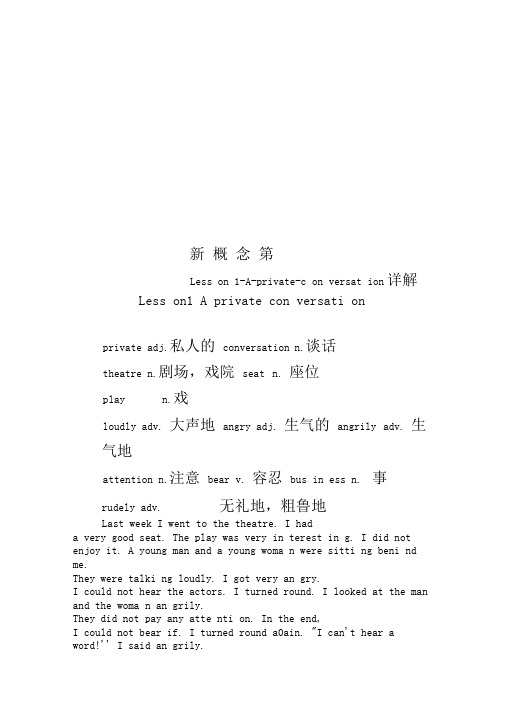
新概念第Less on 1-A-private-c on versat ion详解Less on1 A private con versati onprivate adj.私人的conversation n.谈话theatre n.剧场,戏院seat n. 座位play n.戏loudly adv. 大声地angry adj. 生气的angrily adv. 生气地attention n.注意bear v. 容忍bus in ess n. 事rudely adv. 无礼地,粗鲁地Last week I went to the theatre. I hada very good seat. The play was very in terest in g. I did not enjoy it. A young man and a young woma n were sitti ng beni nd me.They were talki ng loudly. I got very an gry.I could not hear the actors. I turned round. I looked at the man and the woma n an grily.They did not pay any atte nti on. In the end,I could not bear if. I turned round a0ain. "I can't hear aword!'' I said an grily."It's none of your bus in ess," the youngman said rudely. "This is a private con versati on!"参考译文:上星期我去看戏.我的座位很好,戏很有意思,但我却无法欣赏.一青年男子与一青年女子坐在我的身后,大声地说着话.我非常生气,因为我听不见演员在说什么.我回过头去怒视着那一男一女,他们却毫不理会.最后, 我忍不住了,又一次回过头去,生气地说:“我一个字也听不见了!”“不关你的事,“那男的毫不客气地说,“这是私人间的谈话!”go to the theatre = go to the theatre to see a play 去剧场看戏go to the cin ema =see afilm 去rb彫心丢|=b 彫电院院看^电go to the + 人+'s表示去这个人开的店go to the doctor's 去看病;go to the butcher's 买肉以下短语中名词前不加冠词:go to school 去上学;Take a seat, please. 请坐。
新概念2 a private conversation讲稿
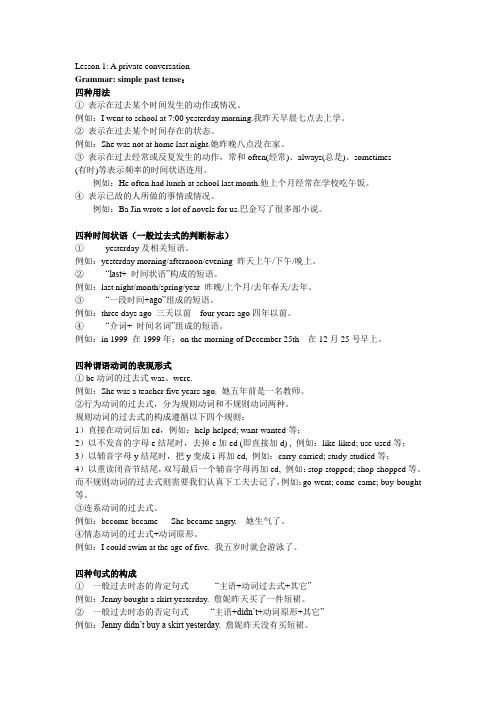
Lesson 1: A private conversationGrammar: simple past tense:四种用法①表示在过去某个时间发生的动作或情况。
例如:I went to school at 7:00 yesterday morning.我昨天早晨七点去上学。
②表示在过去某个时间存在的状态。
例如:She was not at home last night.她昨晚八点没在家。
③表示在过去经常或反复发生的动作,常和often(经常)、always(总是)、sometimes(有时)等表示频率的时间状语连用。
例如:He often had lunch at school last month.他上个月经常在学校吃午饭。
④表示已故的人所做的事情或情况。
例如:Ba Jin wrote a lot of novels for us.巴金写了很多部小说。
四种时间状语(一般过去式的判断标志)①yesterday及相关短语。
例如:yesterday morning/afternoon/evening 昨天上午/下午/晚上。
②“last+时间状语”构成的短语。
例如:last night/month/spring/year 昨晚/上个月/去年春天/去年。
③“一段时间+ago”组成的短语。
例如:three days ago 三天以前four years ago四年以前。
④“介词+ 时间名词”组成的短语。
例如:in 1999 在1999年;on the morning of December 25th 在12月25号早上。
四种谓语动词的表现形式① be动词的过去式was、were.例如:She was a teacher five years ago. 她五年前是一名教师。
②行为动词的过去式,分为规则动词和不规则动词两种。
规则动词的过去式的构成遵循以下四个规则:1)直接在动词后加ed,例如:help-helped; want-wanted等;2)以不发音的字母e结尾时,去掉e加ed (即直接加d) , 例如:like-liked; use-used等;3)以辅音字母y结尾时,把y变成i再加ed, 例如:carry-carried; study-studied等;4)以重读闭音节结尾,双写最后一个辅音字母再加ed, 例如:stop-stopped; shop-shopped等。
新概念英语第二册 第一课 Lesson01 a private conversation
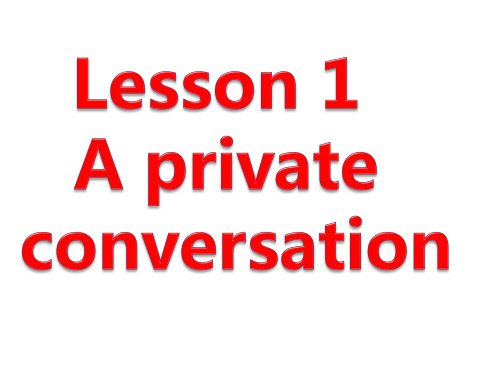
a bear hug 热烈的拥抱 bear 熊
★ business n. 事, 生意
① n. 生意 business man : 生意人 do business: 做生意 on business: 因公出差
② n. 某人自己的私人的事情 It's my business. (指私人的事, 自己处理) It‘s none of your business. 不关你的事。 Mind your own business. 管好自己的事 情。
• seat n.座位 Please take/have
a seat. 请坐下.
Is the seat taken? 这座位有人坐吗?
打篮球 弹钢琴
play n. 戏 看戏 see a play
play v. 打(球),弹奏
play basketball
play the piano
loudly adv. 大声地 现在他们正在大声讲话。
3. The play was very interesting.
interesting adj.
• ---ing 令人… 的 • ---ed 自己感到… 的 • This book is interesting. 书有趣 • be interested in… 对……感兴趣
interest n. 兴趣 have interest in… 对…感兴趣
Words of lesson 1
public theatre
private
conversation
play
angry
angrily
seat
attention
bபைடு நூலகம்siness
stand
新概念英语第二册L1-A-private-conversation
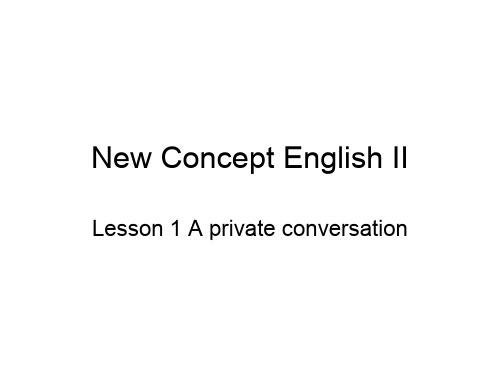
何时何地
• 如果时间和地点连在一起,先放地点,再放时 间
• 如果问何时何地,是一个固定搭配 when and where
Multiple choice questions
1. The writer turned round. He looked at the man and the woman angrily______.
Multiple choice questions
8. He had a good seat. He was sitting in a good ______.
a. chair b. place c. armchair d. class
Multiple choice questions
9. He was a young man. He wasn’t very ______.
与某人谈话 have a conversation with sb.
我和我最好的朋友密谈。 I had a quiet conversation with my closest friend. 我看见他在和朋友说话。 I saw him in conversation with a friend. 我讲话时不要说话。 No conversation while I’m talking.
a. old b. big c. tall d. large
Multiple choice questions
10. The writer looked at the man and the woman angrily. He was very ______.
a. sad b. unhappy c. cross d. pleased
Lesson 1 A private conversation
- 1、下载文档前请自行甄别文档内容的完整性,平台不提供额外的编辑、内容补充、找答案等附加服务。
- 2、"仅部分预览"的文档,不可在线预览部分如存在完整性等问题,可反馈申请退款(可完整预览的文档不适用该条件!)。
- 3、如文档侵犯您的权益,请联系客服反馈,我们会尽快为您处理(人工客服工作时间:9:00-18:30)。
句 子 解 析
专题一:简单陈述句的语序 • 用法:陈述句用来叙述一件事情。每个句子包含 着一个概念,告诉我们一件事情。凡是叙述一件 事情的陈述句都是简单陈述句。 • 陈述句与五种基本句型有很大关系,简单陈述句 一定不能少的就是主语和谓语动词。 • 主语一般是名词、代词或名词短语,通常位于动 词之前。谓语动词必须与主语的数保持一致,即 主语决定谓语动词的单复数(I am,You are, He has),一般情况下,除第三人称单数、单数名词 、单数代词或短语作主语外,其他的作主语时都 不用将动词变单数。
句 子 解 析
• In the end, I could not bear it. I turned round again. “I can't hear a word!”I said angrily. “It's none of your business,”the young man said rudely. “This is a private conversation!”
句 子 解 析
• 专题二:肯定句与否定句的转换 • 肯定句转换成否定句即是在谓语动词前加助 动词,然后在助动词的后面加单词not,若 原来的动词是第三人称单数或过去式,则将 第三人称单数或过去式变回动词原型即可。 • 例句: • I like your cellphone.我喜欢你的手机。 • I do not like your cellphone.我不喜欢你的手 机。 • A dog came to me.一只狗来到我的身边。 • A dog did not come to me.一只狗也没来我身 边。
句 子 解 析
• 例:I have a pen. 我有一支笔。 • You like it. 你喜欢它。 • She knows the place. 她知道这个地方。 (she是第三人称单数,因此,动词know用单数) • They turn around. 他们转过来。(they是 第三人称复数,因此,动词turn不用单数) • 此外,陈述句中得语序也很重要,注意一下两个句 子,仔细体悟。
– The policeman arrested the thief. 警察逮捕了小偷。 – The thief arrested the policeman. 小偷逮捕了警察。
句 子 解 析
• A young man and a young woman were sitting behind me. They were talking loudly. I got very angry. I could not hear the actors. I turned round. I looked at the man and the woman angrily. They did not pay any attention. • get angry 生气 • hear sb. 听到某人(说话) • turn round=turn around 转身 • pay attention 注意
• angrily • rudely
adv. 生气地;气愤地
他生气地说。
– He said angrily.
adv. 无礼地,粗鲁地
– He speaks so rudely. 他说话太无礼了。
New words and expressions
• attention n. 注意;注意力;照料;(口令)立正
theatre n. 剧场,戏院,电影院
movie theatre电影院;电影剧场
seat
n. 座位;职位
例句:Please have a seat. 请坐
New words and expressions
• play n. 戏,戏剧;剧本
– 例句:The applause made it evident that the play was a hit.掌声 表明该剧显然是成功的。 – vt. 游戏;扮演;演奏;播放;同…比赛 – 要记的短语: – play with sb. 和某人玩 – play the violin 拉小提琴
– 固定搭配: – It’s none of your business.不关你的事。 – on business 出差 – 例:She wants to see you on business. 她想趁出差来看看你。
句子解析
• Last week I went to the theatre. I had a very good seat. The play was very interesting. I did not enjoy it. – go to somewhere 去某地 – seat 单数可数名词,因此前面用不定冠词a修 饰 – enjoy it 欣赏它,enjoy oneself=have a good time 玩的开心
play the piano 弹钢琴
New words and expressions
• loudly adv. 大声地;响亮的(是形容词loud的副词)
– speak loudly大声说话;大声的说;大声地说话;大声地说 – shout loudly高声喊叫 – They cheered loudly for their football team.他们大声地为自己的 足球队喊加油。
•
Thank you!
Office
Make Presentation much more fun
• in the end 最后 • I could not bear it. 我不能忍受了。 It在这里是指代前文中男女大声说话但 又不理会作者愤怒目光这件事。英语中 常用it指代一件事或一个物品等。
练习
• • 一、翻译 – 1、Please be seated. – 2、这是一个私人谈话。 – 3、我注意到你了。 二、肯定句变否定 – 1、I enjoy the film very much. – 2、She turned around. – 3、The bird flys away. 三、将下列分散部分排序成为一个完整的正确句子 – 例: I to America went. – I went to America. – 1、 the music I listened to. – 2、drawing She doesn’t like. – 3、understands the girl He.
A private conversation
private adj. 私人的;私有的;下的
New words and expressions
private deposits 私人存款;私家存款 private life 私人生活
conversation n. 谈话;会话;社交;谈话技巧
• •
private conversation私人通话;私密通讯 例句:Education begins a gentleman, conversation completes him. 一个绅士源于教育,成于社交。
New words and expressions
angry adj. 生气的
– I got him angry. 我把他弄生气了。 – 要记的短语(两者不可混用): – be angry with sb.对某人生气 – be angry about sth.因某物/某事而生气 – 例:1.I am very angry with him. 我对他很生气。 – 2.I am angry about his being late.我因为他的迟到而生气。
– 要记的短语: – pay (some/more/no) attention to sb./sth. 注意某人或某事物 – draw/call attention to sth. 引起某人对某事物的注意
• bear n. 熊 v. 容忍;承受; • I could not bear it.我无法忍受 • business n. 事务;商业;生意
